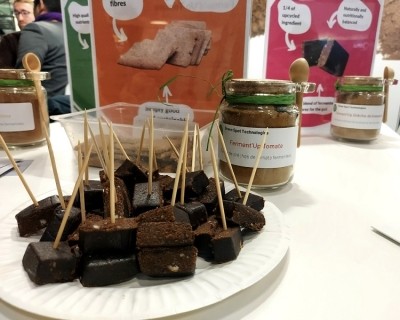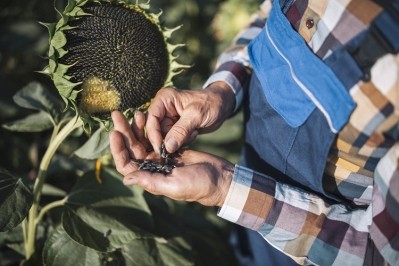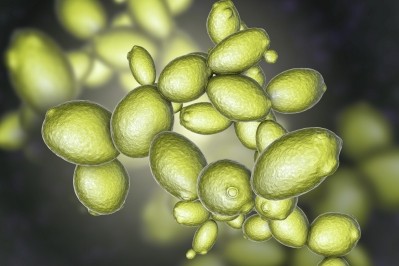From mood-boosting algae to plant-based ‘egg’ powder: Which innovations caught our eye at FiE 2022?

Over a period of three days, ingredients companies are lining the show floor at the Paris Expo Porte de Versaille in the city’s 15th arrondissement. Some are industry veterans, and others, complete newcomers.
This latter cohort caught the eye of FoodNavigator, who was on the ground speaking with innovators re-thinking food ingredients with human and planetary health in mind.
From a blue-green microalgae touting mood-boosting properties to upcycled and fermented alternatives to animal-based protein, we’ve rounded up the most innovative solutions spotted at Food Ingredients Europe (FiE) 2022.
Replacing eggs and butter with plants
It has been estimated that producing a dozen eggs is associated with 2.7kg of CO2e, putting it in a similar category to dairy. At the same time, recent outbreaks of avian flu in Europe are expected to negatively impact egg supply.
Arnaud Delacour (CEO) and Oscar Castellani (CSO), co-founders of France-based The Very Co., are looking to solve both these issues – sustainability and stable supply – with plants. The start-up has developed a line of products designed to replace their conventional, animal-based counterparts: egg, egg white, and butter.
The VERY Co.’s egg replacement product is coined ‘Nomelet’. Like all the start-up’s products, it is completely vegan.
Nomelet will be sold in a powder format, which the company said makes it more sustainable. “Powder is more stable, easier to transport, and good for storage,” explained the start-up. Further, it is more sustainable than liquid-based egg
![NOMELET+FAR_BRETON+COCONUT_P1015724[1]](https://www.foodnavigator.com/var/wrbm_gb_food_pharma/storage/images/_aliases/wrbm_medium/media/images/nomelet-far_breton-coconut_p1015724-1/16003976-1-eng-GB/NOMELET-FAR_BRETON-COCONUT_P1015724-1.jpg)
replacements, we were told, as food makers can add the water themselves to save on transport weight.
The VERY Co. prides itself on a ‘clean’ ingredients list, which in the Nomelet product includes yellow peas, cornflour, and potato protein. Nomelet achieves a Nutri-Score ‘B’.
“Our formulations rely on science and technology to find the optimal combination in the ingredients and process to provide foods with the targeted functional, organoleptic and nutritional qualities.”
Aside from Nomelet, which as the name suggests can be used to make omelettes, as well as tortillas and bakery products, The VERY Co. has also developed a butter replacement, ‘Tourage’, and an egg white substitute sold in liquid form, Noblanc. Tourage can be used to make products such as patisseries, including vegan croissants, and the Noblanc, plant-based meringues.
Having received support from alt protein investor Big Idea Ventures, French investment bank BPI, as well as EIT Food, The VERY Co. is ready to launch onto the B2B ingredients market.
Upcycled and fermented ingredients
The UN estimates that one-third of all food intended for human consumption is lost or wasted. French start-up Green Spot Technologies is tackling food waste by upcycling by-products from local industry.
In the production of apple juice, for example, the pulp and skin are not used – and instead discarded or downcycled into animal feed. Green Spot Technologies is taking this would-be waste, fermenting it, and drying it for use as an ingredient – named Ferment’Up Pomme – by the food industry.
The start-up is doing the same with would-be waste from ketchup manufacturing. Its ingredient, Ferment’Up Tomate, can be used in meat analogue products. In a prototype product, the start-up used 8-10% Ferment’Up Tomate in a plant-based burger, and observed it also served to reduce the list of ingredients by adding flavour, colour, and added to its texture.
Aside from collaborating with juice, wine, and ketchup manufacturers, the start-up is also sourcing raw materials from beer brewers. By fermenting and drying brewers spent grain, Green Spot Technologies has developed Ferment’Up Drêches de brasserie, which can be used to make snack bars. In a date-based bar FoodNavigator sampled at FiE, Ferment’Up Drêches made up 25% of the final formulation.
The start-up is currently based in Toulouse, but will soon be expanding production to southeast France, near Avignon, to place the company closer to its suppliers.
Algae with a ‘positive effect’ on mood and activity
The benefits of freshwater microalgae Aphanizomenon flos-aque (AFA) are varied. Research suggests the blue-green algae has antioxidant and inflammatory properties, and scientist have even suggested it could even have an antitumor property.
AFA is naturally found in the Klamath Lake in Oregan US. Legend has it that indigenous peoples saw eagles flying into the Klamath Lake to feed on the blue/green freshwater microalgae and, inspired by the eagles, the Indians followed suit. Upon consuming AFA, the peoples felt happier and better fed, explained Vinh Ly at FiE in Paris.
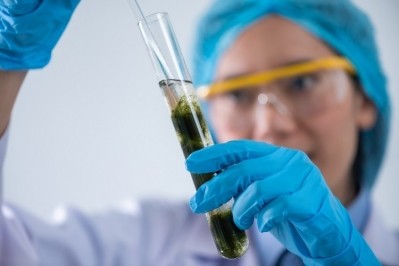
Ly is CEO of Kyanos Biotechnologies, which he claims is the only company in the world to cultivate and produce AFA. While the microalgae continues to grow naturally in Klamath Lake, toxins are negatively impacting its production, he explained.
Kyanos Biotechnologies’ AFA contained 60% plant-based protein, and is a source of phenylethylamine, phycocyanine, vitamins, and all essential amino acids. Further, it contains PEA which ‘contributes to positive effect on mood and activity’ as well as vitamin B12, which contributes to the normal function of the nervous and immune systems while helping to reduce fatigue.
Importantly, it is not considered a novel food under EU law.
In Kyanos Biotechnologies’ patented indoor production method, the company grows other types of microorganisms alongside the AFA to protect against toxins. The company leverages by-products as feedstock, to which it adds the recycled non-AFA algae after harvest.
Under the Pastel d’Eau brand name, the company plans to first sell its AFA as health supplements, before moving into functional foods.
Upcycled brewers’ spent grain
Beer is the third most consumed beverage in the world, behind water and tea. Globally, it is estimated that 200bn litres of beer are brewed annually. In this process, grains provides sugars and a small percentage of starch, before being discarded or downcycled into animal feed.
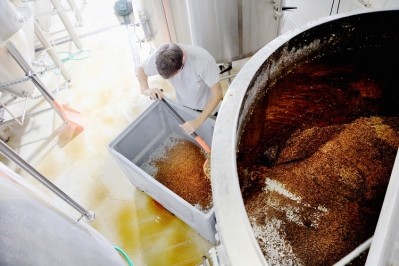
However, as Aviaja Rieman-Andersen told FoodNavigator at FiE, after the brewing process the grains still contain aromas and energy. Rieman-Andersen, together with co-founders Karin Beukel and Emil Kroell, set up Denmark-based Circular Food Technology in 2018 to give brewers’ spent grain a new life.
Specifically, Rieman-Andersen and Beukel (Kroell has since left the business) upcycle brewers’ spent grain from beer and whisky production. In 2009, the founders established the Agrain brand, under which its sells flour made from brewers’ spent grain.
Every 500g bag of flour used can save the equivalent of two square-metres of agricultural land. The company does not use water in its production, and according to third party agency RE-VIU, CO2 emissions from its production are calculated at just 0.59 CO2e per kg of flour (unpackaged). Further, its Super Grain Flour contains 20% protein and 50% dietary fibre.
To demonstrate the product’s versatility, Agrain has developed a line of retail products – ranging from crisps to granola and crackers – which it sells into retail. But, as Rieman-Andersen explained, the company is focused on the B2B market.
“In order to develop a truly circular food system, there has to be volume. There is enough raw material [available], but not enough will be sold in crisps…it has to be sold in flour. Crisps, however, can help industry understand its potential,” she told FoodNavigator.
Nanotechnology in food
The health and wellness trend is well and truly established. Yet, not all health ingredients are stable enough to withstand all

cooking conditions.
In Spain, a start-up working to protect these ingredients with miniature encapsulation technology. Nucaps, based in Navarra, Spain, is developing nanocapsules and biocapsules for bioactives and prebiotics.
Nucaps’ technology can be used to encapsulate antioxidants, probiotics, flavonoids, or DHA in either the nutraceutical or food industries, we were told at FiE. The protein-based technology is protected in harsh cooking environments, for example when baked in bread.
According to the start-up, the size of nanocapsules can be adjusted to avoid the nanomaterial label.
